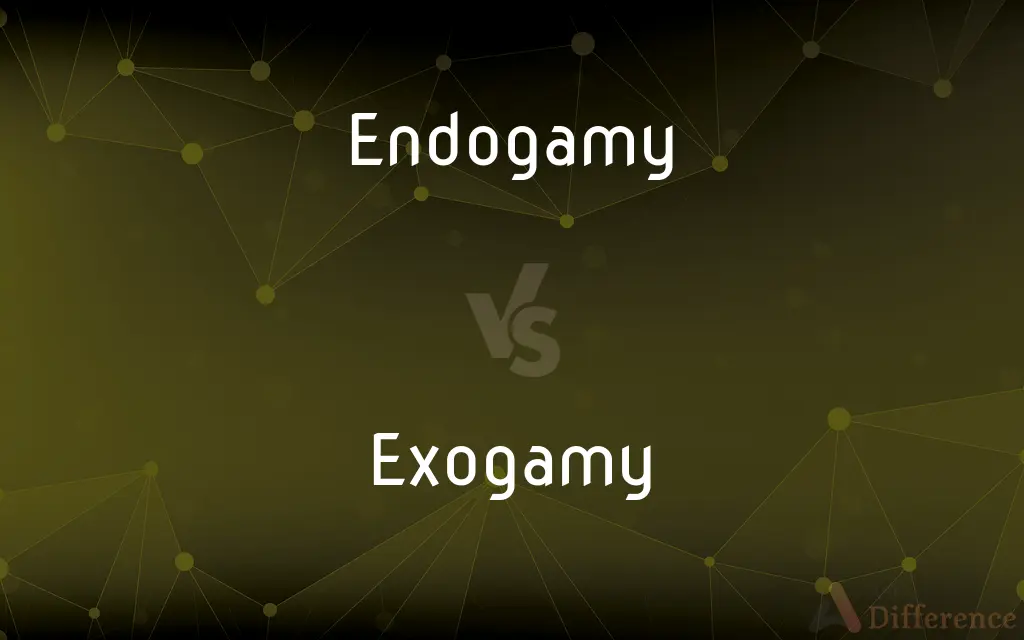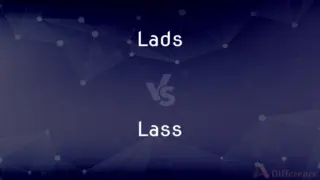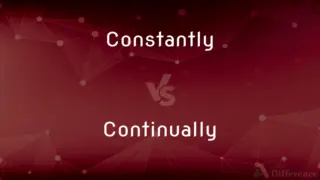Endogamy vs. Exogamy — What's the Difference?
Edited by Tayyaba Rehman — By Maham Liaqat — Updated on March 26, 2024
Endogamy encourages marriage within a specific social group or ethnicity to maintain cultural identity, while exogamy promotes marrying outside one’s group, enhancing genetic diversity and social alliances.

Difference Between Endogamy and Exogamy
Table of Contents
ADVERTISEMENT
Key Differences
Endogamy is a social practice where marriages occur within a specific community, caste, or ethnic group, aiming to preserve cultural heritage and strengthen community bonds. On the other hand, exogamy requires individuals to marry outside their immediate social group, fostering genetic diversity and building relationships between different communities.
Endogamy often reflects social norms and traditions that emphasize the importance of cultural continuity, which can be seen in many societies that value lineage purity and social cohesion. Whereas, exogamy is celebrated for its role in expanding social networks and reducing the risks associated with genetic diseases through broader genetic mixing.
In societies practicing endogamy, there can be a strong emphasis on social identity and belonging, where marriage serves as a means of reaffirming one’s place within a particular social or ethnic group. Conversely, exogamous practices highlight the importance of social integration and the bridging of cultural gaps, promoting tolerance and understanding among diverse groups.
Endogamy can sometimes lead to social isolation or limited social mobility for the groups involved, as it restricts marriage options to a narrow pool of candidates. Exogamy, however, can encourage social mobility and integration by opening up a wider array of marriage possibilities across different social, ethnic, or cultural lines.
While endogamy reinforces existing social structures and relationships within a community, exogamy can introduce new cultural practices and ideas, leading to cultural evolution and adaptation. This dynamic interplay between endogamy and exogamy shapes the social and genetic landscape of human populations.
ADVERTISEMENT
Comparison Chart
Definition
Marrying within a specific social group or ethnicity
Marrying outside one’s specific social group or ethnicity
Purpose
Preserves cultural identity and strengthens community bonds
Enhances genetic diversity and promotes social alliances
Social Implications
Can reinforce social cohesion and continuity within a group
Encourages social integration and cultural exchange
Genetic Aspects
May increase risk of genetic disorders due to less diversity
Reduces risk of genetic disorders with more diverse gene pool
Cultural Impact
Maintains traditional values and practices
Introduces new cultural practices and fosters adaptation
Compare with Definitions
Endogamy
Reflects traditions that prioritize lineage and social continuity.
Endogamy in certain cultures is enforced to maintain social status.
Exogamy
Promotes tolerance and understanding among different groups.
The policy of exogamy fostered a spirit of inclusiveness.
Endogamy
Can limit social mobility due to restricted marriage options.
His career opportunities were limited by the community’s endogamy.
Exogamy
Encourages cultural exchange and social integration.
Her marriage was an example of exogamy, blending two diverse cultures.
Endogamy
A practice aimed at strengthening community bonds through intra-group marriage.
The village's endogamy rules ensured that traditions were preserved.
Exogamy
Reduces genetic risks by widening the gene pool.
Exogamy has helped decrease the occurrence of inherited diseases in the community.
Endogamy
Often associated with preserving inherited social or economic status.
Endogamy has been crucial in maintaining the family's wealth.
Exogamy
Can challenge traditional values by introducing new cultural practices.
Exogamy introduced the community to new religious practices.
Endogamy
Marrying within one's own social group to maintain cultural or ethnic purity.
In many royal families, endogamy was practiced to keep the bloodline pure.
Exogamy
Marrying outside one's social group to foster genetic diversity and alliances.
Exogamy was encouraged to bring new strengths to the tribe.
Endogamy
Endogamy is the practice of marrying within a specific social group, religious denomination, caste, or ethnic group, rejecting those from others as unsuitable for marriage or other close personal relationships. Endogamy is common in many cultures and ethnic groups.
Exogamy
The custom of marrying outside a community, clan, or tribe.
Endogamy
The custom of marrying only within the limits of a local community, clan, or tribe.
Exogamy
Exogamy is the social norm of marrying outside one's social group. The group defines the scope and extent of exogamy, and the rules and enforcement mechanisms that ensure its continuity.
Endogamy
The fusion of reproductive cells from related individuals; inbreeding; self-pollination.
Exogamy
The fusion of reproductive cells from distantly related or unrelated individuals; cross-pollination.
Endogamy
(Anthropology) The custom of marrying within a particular social or cultural group in accordance with custom or law.
Exogamy
(Anthropology) The custom of marrying outside the tribe, family, clan, or other social unit.
Endogamy
(Biology) Reproduction by the fusion of gametes of similar ancestry, as in self-pollination or inbreeding.
Exogamy
(Biology) The fusion of gametes from individuals that are not closely related, as in outbreeding.
Endogamy
The practice of marrying or requiring to marry within one's own ethnic, religious, or social group.
Exogamy
Marriage to a person belonging to a tribe or group other than one's own as required by custom or law
Endogamy
(biology) The fusion of two related gametes.
Exogamy
(biology) the fusion of two unrelated gametes
Endogamy
Marriage only within the tribe; a custom restricting a man in his choice of a wife to the tribe to which he belongs; - opposed to exogamy.
Exogamy
The custom, or tribal law, which prohibits marriage between members of the same tribe; marriage outside of the tribe; - opposed to endogamy.
Endogamy
Marriage within one's own tribe or group as required by custom or law
Exogamy
Marriage to a person belonging to a tribe or group other than your own as required by custom or law
Common Curiosities
What is endogamy?
Endogamy is the practice of marrying within a specific social, ethnic, or cultural group to preserve cultural identity.
Why do some cultures practice endogamy?
Cultures practice endogamy to maintain cultural continuity, reinforce social cohesion, and preserve traditional values.
How does exogamy affect social structures?
Exogamy can lead to the integration of different social groups, promoting tolerance and understanding.
Does exogamy have any drawbacks?
Exogamy can sometimes challenge traditional values and may lead to cultural assimilation.
How do endogamy and exogamy influence social mobility?
Endogamy can restrict social mobility by limiting marriage options, while exogamy can enhance it by broadening social networks.
What is exogamy?
Exogamy is the practice of marrying outside one’s social, ethnic, or cultural group, promoting genetic diversity and social alliances.
What are the benefits of exogamy?
Exogamy enhances genetic diversity, encourages cultural exchange, and fosters social integration.
Is endogamy more common in specific regions?
Endogamy is often more common in regions with strong cultural or religious traditions that emphasize social homogeneity.
Do modern societies favor endogamy or exogamy?
Modern societies tend to show a greater acceptance of exogamy, reflecting globalized values of diversity and integration.
Can endogamy affect genetic health?
Yes, endogamy can increase the risk of genetic disorders due to a smaller genetic pool.
Are there legal restrictions on endogamy or exogamy?
In some regions, legal restrictions may apply to endogamy or exogamy, often based on historical, social, or religious grounds.
How do endogamy and exogamy affect cultural identity?
Endogamy reinforces cultural identity within a group, whereas exogamy can lead to the blending and evolution of cultural identities.
Can endogamy and exogamy coexist within the same society?
Yes, endogamy and exogamy can coexist within the same society, reflecting diverse social norms and values.
Can exogamy contribute to peace between different groups?
Yes, exogamy can contribute to peace and understanding between different groups by fostering alliances and empathy.
How do individuals choose between endogamy and exogamy?
Individual choices between endogamy and exogamy are often influenced by cultural, social, and personal factors.
Share Your Discovery

Previous Comparison
Lads vs. Lass
Next Comparison
Constantly vs. ContinuallyAuthor Spotlight
Written by
Maham LiaqatEdited by
Tayyaba RehmanTayyaba Rehman is a distinguished writer, currently serving as a primary contributor to askdifference.com. As a researcher in semantics and etymology, Tayyaba's passion for the complexity of languages and their distinctions has found a perfect home on the platform. Tayyaba delves into the intricacies of language, distinguishing between commonly confused words and phrases, thereby providing clarity for readers worldwide.














































